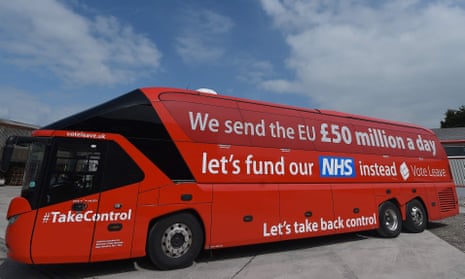Brexit is already costing the public purse £500m a week, new research has found – a stark contrast to the £350m “dividend” promised by the Leave campaign. The Centre for European Reform’s analysis also suggests that the government’s austerity drive would be on the way to completion had Britain voted to stay in the European Union.
It shows that the UK economy is already 2.5% smaller than it would have been had Remain won the referendum. Public finances have been dented by £26bn a year, more than half of the defence budget. This translates to a penalty of £500m a week, a figure that is growing.
The stark finding comes as the Tory conference begins in Birmingham, with Theresa May’s premiership under severe strain. The prime minister faces competing proposals from cabinet ministers over how she should resolve the Brexit impasse with the EU.
The febrile conference coincides with explosive claims that the boss of one UK-based carmaker has been flown by private jet to meet President Emmanuel Macron, in an attempt to persuade the company to move manufacturing to France after Brexit.
Carolyn Fairbairn, director general of the Confederation of British Industry, told the Observer this development was a sign of the damage Britain faces from the wrong deal.
While some ministers are pushing for a loose, Canada-style trade deal, support is growing in May’s ministerial team for a deal under which Britain would stay closely tied to the EU for a limited period.
May is being warned that for some businesses a Canada-style deal is little better than crashing out of the EU with no agreement in place. Fairbairn said that companies were already acting to minimise the impact of trade friction at Britain’s borders.
“Among car manufacturers, we have heard of one CEO who has been flown out on private jets to meet Macron about relocating his entire business,” she said. “You have got tens of millions being spent by firms on preparing for friction at borders.
“One of the reasons that the government’s proposals are on the right track is that they will mean no friction at borders. This is what the Canada deal does not do. It does not do it in some really fundamental ways. For some of our members, it is not much better than a no-deal outcome.”
A YouGov poll of 1,000 entrepreneurs and chief executives, carried out by the People’s Vote for another referendum, suggests the Tories risk denting their pro-business reputation over the handling of the Brexit talks. Almost three-quarters (73%) believe Britain is heading for a bad deal. Dominic Grieve, the former attorney general, said it suggested the party was “jeopardising its reputation for economic competence with the business community as a result of the way Brexit has unfolded”.
Meanwhile, Britain’s wealthiest funder of independent scientific research, the Wellcome Trust, says it is losing patience with the government. Writing in the Observer, the trust’s director states that in common with industry and universities, his organisation – which spends more than £1bn a year on medical research – is increasingly nervous. “No deal would leave a void on access to funding, regulation and, critically, migration,” Jeremy Farrar states. “Wellcome … wants to support researchers, wherever they are from, in order to tackle the greatest global health challenges. But if the conditions and the culture here are damaged that will affect our support. It is not unconditional.”
The CER thinktank’s model on the costs of Brexit examined its impact up until the end of June. It said the findings were a central estimate that contained a margin of error. Researchers created a model of how the economy would have fared had Remain won in June 2016. An earlier estimate in the summer suggested that Britain’s economy was 2.1% smaller than it would have been by the end of the first quarter of 2018. As it has developed its model and updated it for the second quarter of 2018, the gap has grown.
The model also suggests that had Britain not voted to leave, the deficit would be down to just 0.1% of GDP, or £2bn. It would mean the austerity drive in place since 2010 would be all but complete.

Comments (…)
Sign in or create your Guardian account to join the discussion